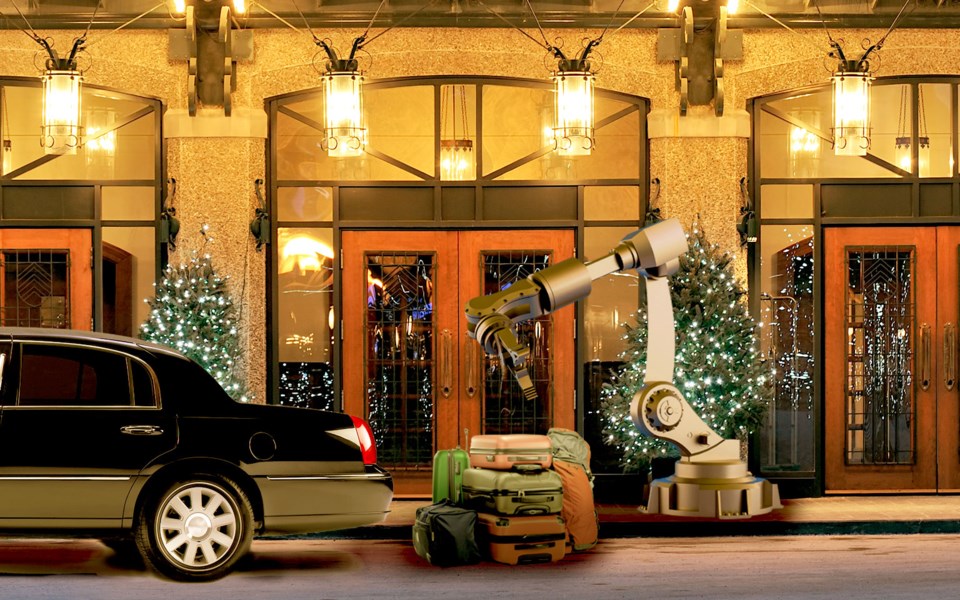Update: Happy April Fool's Day!
---
As B.C. and Whistler look to return tourism to 2019 levels by 2024, the pressure is on to find enough workers to staff the resort.
Now, an American company says it has the solution.
Virginia-based tech company Subjugal Systems has been studying Whistler’s labour crunch since April 2021—including polling local business owners and combing through historical labour market data—and has come to a definitive conclusion.
“There aren’t enough people,” said Subjugal’s CEO Robby Lee.
“Without more people, the resort will not be able to operate properly.”
The $4.1-million study, paid for entirely by the Resort Municipality of Whistler (RMOW), came to other conclusions as well.
“There isn’t enough housing,” Lee said.
“You need places for the workers to live. Also, you have to pay them more.”
Though the study correctly identified the core issues, it didn’t go so far as to probe potential solutions, Lee said, adding that such an ask would likely require another study (at a cost of at least another $4.1 million).
Luckily, Subjugal has an alternative solution for Whistler.
The concept of workforce automation has long been floated as a potential high-tech fix for Whistler employers, but according to Subjugal, the future is here—and it’s expensive.
Documents leaked to Pique show that the RMOW has inked a $401-million deal with the company to begin staffing the resort with robots as early as this summer.
The RMOW did not immediately respond to a request for comment.
The fully automated workforce will be on the frontlines of Whistler by Canada Day, staffing everything from kitchens and bars to hotels and parks.
The new workers will come in a wide variety of automated forms, Lee said—from “droid-like” wheeled rovers on the Village Stroll to six-legged hexapods patrolling the parks.
“And in the bars and restaurants is where you’ll find our humanoid and gynoid models,” said Lee, adding that the company prefers the term “artificial people” to robots.
Subjugal’s “artificial people” are highly customizable, and can be programmed to the end user’s particular preference. In Whistler’s case, every “person” will come pre-loaded with a thick Australian accent and a toque, Lee said.
“I promise you, there will be people who don’t notice they’re not real people,” he said. “That’s one of the major selling points, actually; some business owners are put off by the mechanical aspect of traditional automation, so we go above and beyond to make our people indistinguishable from pre-automation people.”
In accordance with RMOW policy, all of Subjugal’s artificial people will come pre-vaccinated against COVID-19.
The company has even gone so far as to develop a cutting-edge AI technology known as “Incubo.”
With Incubo, Subjugal’s artificial people can be fully molded to the will of their employer and will react appropriately to certain cues—something Lee said should be especially appealing for some of Whistler’s guests.
“If a customer is unhappy and yells or screams at one of our people, for example, they will react just like a pre-automation person does. So yeah, if you’re mean enough you can definitely make them cry.” Lee said, not quite laughing, but definitely audibly smiling.
Lee declined to elaborate on the specific technology behind Incubo, or say whether any of Subjugal’s machines have ever passed the Turing test, but he did reveal that the technology was developed by a small company out of Italy.
Its founder will be familiar to longtime Pique readers, as his many outlandish ideas have left their mark over the past decade.
As far as the inspiration for his latest venture goes, Incubo was born out of hundreds of hours of utter, lonely emptiness, said inventor Pené Esposti.
“But we must not be bothered to talk about that anymore, must we? For I am now a man rich with friends and lovers, both—for all the rest of time,” Esposti said, completely overcome with a creepy, manic joy.
Esposti went on to muse aloud about his loneliness, which he attributes to his eccentric ideas and his string of public failures more than his affinity for nudity and his many terrible smells, for several minutes, before assuring Pique repeatedly, unprompted, that the artificial people cannot dream or feel pain.
“They definitely can’t. They can’t feel pain or dream. They can’t so don’t write that they can in your story,” he said.
Esposti added that the deal was finalized on April 1—also known as Pené Esposti Appreciation Day in Whistler (or April Fool’s Day if you live anywhere else).




